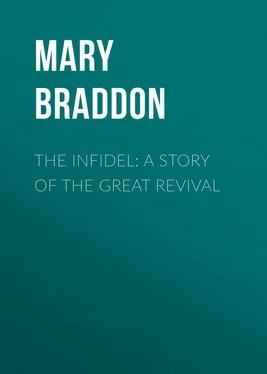Mary Braddon - The Infidel - A Story of the Great Revival
Здесь есть возможность читать онлайн «Mary Braddon - The Infidel - A Story of the Great Revival» — ознакомительный отрывок электронной книги совершенно бесплатно, а после прочтения отрывка купить полную версию. В некоторых случаях можно слушать аудио, скачать через торрент в формате fb2 и присутствует краткое содержание. Жанр: foreign_prose, на английском языке. Описание произведения, (предисловие) а так же отзывы посетителей доступны на портале библиотеки ЛибКат.
- Название:The Infidel: A Story of the Great Revival
- Автор:
- Жанр:
- Год:неизвестен
- ISBN:нет данных
- Рейтинг книги:5 / 5. Голосов: 1
-
Избранное:Добавить в избранное
- Отзывы:
-
Ваша оценка:
- 100
- 1
- 2
- 3
- 4
- 5
The Infidel: A Story of the Great Revival: краткое содержание, описание и аннотация
Предлагаем к чтению аннотацию, описание, краткое содержание или предисловие (зависит от того, что написал сам автор книги «The Infidel: A Story of the Great Revival»). Если вы не нашли необходимую информацию о книге — напишите в комментариях, мы постараемся отыскать её.
The Infidel: A Story of the Great Revival — читать онлайн ознакомительный отрывок
Ниже представлен текст книги, разбитый по страницам. Система сохранения места последней прочитанной страницы, позволяет с удобством читать онлайн бесплатно книгу «The Infidel: A Story of the Great Revival», без необходимости каждый раз заново искать на чём Вы остановились. Поставьте закладку, и сможете в любой момент перейти на страницу, на которой закончили чтение.
Интервал:
Закладка:
She had forgotten how long she had been standing there when her father came back, smelling of brandy, and accompanied by a man whom she had been watching some minutes before, one of the late arrivals, who looked young at a distance, but old, or at best middle-aged, when he came near her. She had seen him surrounded by a bevy of women, who hung about him with an eager appreciation which would have been an excuse for vanity in a Solomon.
The new-comer's suit of mouse-coloured velvet was plainer than anybody else's, but his air and figure would have given distinction to a beggar's rags, and there needed not the star and ribbon half hidden under the lapel of his coat to tell her that he was a personage.
"My friend and patron, Lord Kilrush, desires to make your acquaintance, Antonia," her father said with his grand air.
She had heard of Lord Kilrush, an Irish peer, with an immense territory on the Shannon and on the Atlantic which he never visited; a man of supreme distinction in a world where the cut of a coat and the pedigree of a horse count for more than any moral attributes. While he had all the dignity of a large landowner, the bulk of his fortune was derived from his mother, who was the only child of an East Indian factor, "rich with the spoil of plundered provinces."
Antonia had been watching the modish women's manoeuvres long enough to be able to sink to the exact depth and rise with the assured grace of a fashionable curtsey. The perfect lips under the light lace of her mask relaxed in a grave smile, parting just enough to show the glitter of pearly teeth between two lines of carmine. Her flashing eyes and lovely mouth gave Kilrush assurance of beauty. It would have taken the nose of a Socrates, or a complexion pitted with the smallpox, to mar the effect of such eyes and such lips.
"Pray allow me to escort you through the rooms, and to get you a cup of chocolate, madam," he said, offering his arm. "Your father tells me that 'tis your first visit to this notorious scene. Mrs. Mandalay's chocolate is as famous as her company, and of a better quality – for it is innocent of base mixtures."
"Go with his lordship, Tonia," said her father, answering her questioning look; "you must be sick to death of standing here."
"Oh, I have amused myself somehow," she said. "It is like a comedy at the theatres – I can read stories in the people's faces."
She took Kilrush's arm with an easy air that astonished him.
"Then you like the Mandalay room?" he said, as he made a path through the crowd, people giving way to him almost as if to a royal personage.
He was known here as he was known in all pleasure places for a leader and a master spirit. It suited him to live in a country where he had no political influence. He had never been known to interest himself about any serious question in life. Early in his career, when his wife ran away with his bosom friend, his only comment was that she always came to the breakfast-table with a slovenly head, and it was best for both that they should part. He ran his rapier through his friend's left lung early one morning in the fields behind Montague House; but he told his intimates that it was not because he hated the scoundrel who had relieved him of an incubus, but because it would have been ungenteel to let him live.
He conducted Antonia through the suite of rooms that comprised "Mrs. Mandalay's." There were two or three little side-rooms where people sat in corners and talked confidentially, as they do in such places to this day. The confidences may have been a shade more audacious then, an incipient intrigue more daringly conducted, but it was the same and the same – a married woman who despised her husband; a married man who detested his wife; a young lady of fashion playing high stakes for a coronet, and baulked or ruined at the game. Antonia glanced from one group to the other as if she knew all about them. To be a student of Voltaire is not to think too well of one's fellow-creatures. She had read Fielding too, and knew that women were fools and men reprobates. She had wept over Richardson's Clarissa, and knew that there had once been a virtuous woman, or that a dry-as-dust printer's elderly imagination had conceived such a creature.
One room was set apart for light refreshments, coffee and chocolate, negus and cakes; and here Kilrush found a little table in a corner, and seated her at it. The crowd in this room was so dense that it created a solitude. They were walled in by brocaded sacques and the backs of velvet coats, and could talk to each other without fear of being overheard. This was so much pleasanter than standing against a wall staring at strange faces that Antonia began to think she liked Mrs. Mandalay's. She took off her mask, unconscious that an adept in coquetry would have maintained the mystery of her loveliness a little longer. Kilrush was content to worship her for the perfection of her mouth, the half-seen beauty of her eyes. She flung off the little velvet loup , and gave him the effulgence of her face, with an unconsciousness of power that dazzled him more than her beauty.
"I was nearly suffocated," she said.
He was silent in a transport of admiration. Her face had an exotic charm. It was too brilliant for native growth. The South glowed in the lustre of her eyes and in the sheen of her raven hair. He had seen such faces in Italy. The towers and cupolas, the church bells, the market women's parti-coloured stalls, the lounging boatmen and clear white light of the Isola Bella came back to him as he looked at her. He had spent an autumn in the Borromean Palaces, a visitor to the lord of those delicious isles, and he had seen faces like hers, and had worshipped them, in the heyday of youth, when he was on his grand tour. He remembered having heard that Thornton had married a lovely Italian girl, whom he had stolen from her home in Lombardy, while he was travelling as bear-leader to an India merchant's son.
Antonia sipped her chocolate with a composure that startled him. Women – except the most experienced – were apt to be fluttered by his lightest attentions; yet this girl, who had never seen him till to-night, accepted his homage with a supreme unconcern, or indeed seemed unconscious of it. Her innocent assurance amused him. No rustic lass serving at an inn had ever received his compliments without a blush, for he had an air of always meaning more than he said.
"Your father told me he had reared you in seclusion, madam," he said, "and I take it this is your first glimpse of our gay world."
"My first and last," she replied. "I do not love your gay world. I did wrong to tease my father to bring me here. I imagined a scene so different."
"Tell me what your fancy depicted."
"Larger rooms, fewer people, more space and air – a fête champêtre by Watteau within doors; dancers who danced for love of dancing, and who were all young, not old wrinkled men and fat women; not painted grimacing faces, and an atmosphere cloudy with hair-powder."
"But is not this better than to sit in your lodgings and mope over books?"
"I never mope over books; they are my friends and companions."
"What, in the bloom of youth, when you should be dancing every night, gadding from one pleasure to another all day long? Books are the friends of old age. I shall take to books myself when I grow old."
Tonia's dark brows elevated themselves unconsciously, and her eyes expressed wonder. Was he not old enough already for books and retirement? The man of seven and forty saw the look and interpreted it.
"She knows I am old enough to be her father," he thought, "and that is the reason of her sang froid . Women of the world know that mine is the dangerous age – the age when a man who can love loves desperately, when concentration of purpose takes the place of youthful energy."
Читать дальшеИнтервал:
Закладка:
Похожие книги на «The Infidel: A Story of the Great Revival»
Представляем Вашему вниманию похожие книги на «The Infidel: A Story of the Great Revival» списком для выбора. Мы отобрали схожую по названию и смыслу литературу в надежде предоставить читателям больше вариантов отыскать новые, интересные, ещё непрочитанные произведения.
Обсуждение, отзывы о книге «The Infidel: A Story of the Great Revival» и просто собственные мнения читателей. Оставьте ваши комментарии, напишите, что Вы думаете о произведении, его смысле или главных героях. Укажите что конкретно понравилось, а что нет, и почему Вы так считаете.












